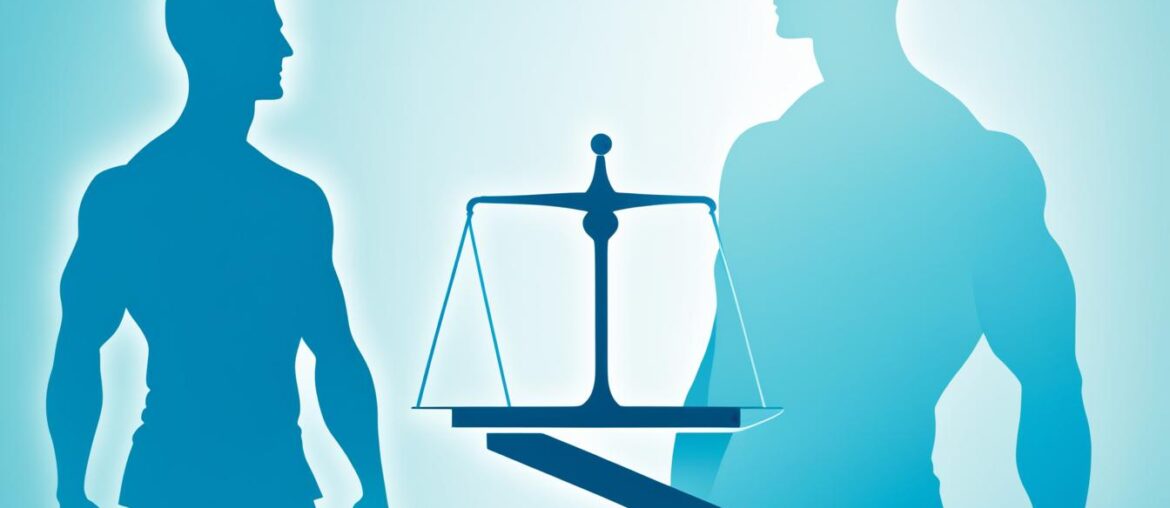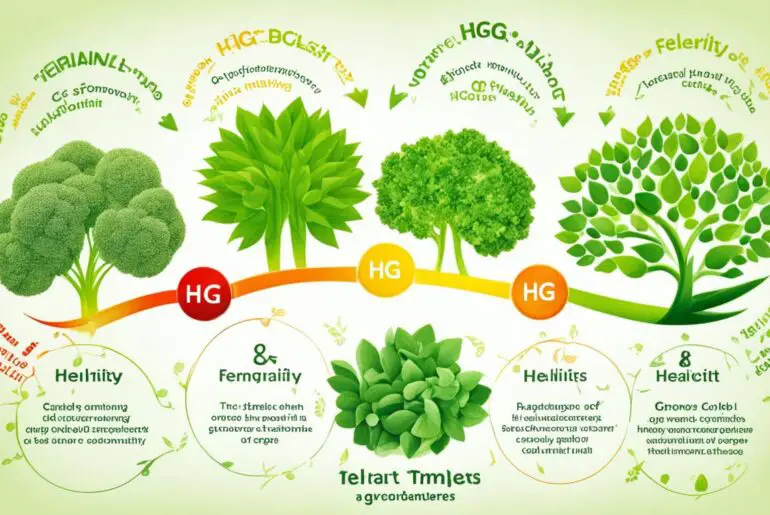Are you looking to restore your hormone balance and improve your overall health as a man? Have you heard about the benefits of HCG therapy, but you’re not sure if it’s right for you? Let’s delve into the world of HCG hormone balance for men’s health and uncover the truth behind this revolutionary therapy.
- HCG therapy can be a vital component of Testosterone Replacement Therapy (TRT) for men, helping to maintain fertility, testicular and penis size, cognitive function, and libido.
- There is support from some Endocrinologists for the use of HCG alongside testosterone, while others are divided on its benefits.
- HCG mimics luteinizing hormone (LH) and stimulates testosterone production in the testes, making it crucial for maintaining hormone balance on TRT.
- HCG offers several benefits, including improved fertility, preservation of testicular and penis size, enhanced libido and sensitivity, and potential up-regulation of steroid hormones.
- HCG plays a vital role in maintaining testicular function, spermatogenesis, and the overall hormonal balance in the body.
The Role of HCG in Testosterone Replacement Therapy
HCG (Human Chorionic Gonadotropin) plays a crucial role in Testosterone Replacement Therapy (TRT) by mimicking luteinizing hormone (LH) and stimulating testosterone production in the Leydig cells of the testes. Unlike traditional TRT, which suppresses LH release, HCG helps to preserve testicular function and maintain fertility while on hormone replacement therapy.
When undergoing TRT, it is important to consider the role of HCG beyond testosterone. By incorporating HCG into the treatment plan, men can optimize hormone balance and experience the full benefits of therapy. Let’s explore the different aspects of HCG in testosterone therapy.
HCG in Testosterone Monotherapy
In some cases, HCG can be used as a standalone treatment for testosterone deficiency. It stimulates the testes to produce testosterone and can help men restore their hormone levels without the need for exogenous testosterone. This approach is known as testosterone monotherapy with HCG and may be suitable for certain individuals.
HCG and Fertility Preservation
One of the significant advantages of incorporating HCG into TRT is its role in preserving fertility. Traditional TRT suppresses LH release, which can impair sperm production and cause infertility in men. However, by using HCG alongside testosterone, adequate LH signaling is maintained, allowing for ongoing sperm production and fertility preservation.
HCG stimulates the Leydig cells to produce testosterone, which supports both the hormone balance necessary for overall well-being and the maintenance of fertility. Thus, men who wish to preserve their fertility while on TRT should strongly consider including HCG in their treatment plan.
| Benefits of HCG in Testosterone Replacement Therapy | |
|---|---|
| Improved Fertility: | HCG helps maintain LH signaling, enabling ongoing sperm production and preserving fertility. |
| Preservation of Testicular Function: | HCG promotes testicular health and prevents testicular atrophy, ensuring optimal function. |
| Enhanced Libido and Sexual Function: | HCG can improve libido, sensitivity, and sexual function, enhancing overall well-being. |
| Up-regulation of Steroid Hormones: | By stimulating testosterone production, HCG may have an indirect effect on other steroid hormones, optimizing their levels in the body. |
HCG and Testosterone Replacement Therapy
When considering TRT, it is essential to address the complete hormone picture. While testosterone is the primary hormone involved in therapy, incorporating HCG ensures the preservation of testicular function, fertility, and overall hormone balance. By combining testosterone and HCG, men can achieve a comprehensive hormone replacement therapy approach that encompasses all relevant aspects of their well-being.
How HCG Works in the Body
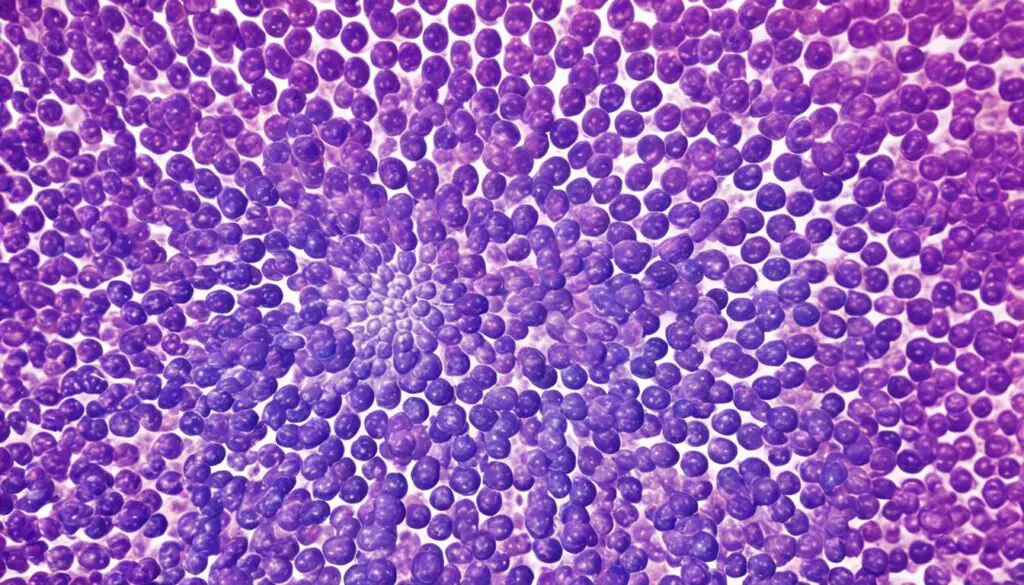
HCG, also known as human chorionic gonadotropin, operates in the body through a mechanism of action that involves gene expression and steroid synthesis. Structurally, HCG closely resembles luteinizing hormone (LH) and acts as an LH-analogue. Compared to LH, HCG has a longer half-life, making it suitable for maintaining stable blood levels with daily injections.
When HCG is administered, it stimulates the Leydig cells in the testes to produce testosterone. This stimulation occurs through gene expression, which activates the production of testosterone and other steroid hormones involved in the body’s hormonal balance. In addition to testosterone production, HCG also plays a crucial role in sperm production, supporting fertility in men.
Unlike LH, which is released by the body in a pulsatile manner, HCG provides a more constant stimulation of the Leydig cells. This consistent stimulation helps maintain stable testosterone levels and promotes optimal hormonal balance in the body.
Comparison of HCG and LH
| HCG | LH | |
|---|---|---|
| Structural Similarity | Structurally similar to LH | Naturally produced by the body |
| Half-life | Longer half-life | Short half-life |
| Release Pattern | Provides constant stimulation | Released in a pulsatile manner |
| Role | Stimulates testosterone and sperm production | Induces ovulation and menstrual cycle in women |
Overall, the unique mechanism of action of HCG makes it an essential component of hormone replacement therapy, particularly in maintaining testicular function, fertility, and hormonal balance. Its LH-analogue properties, gene expression effects, and stimulation of steroid synthesis contribute to the overall effectiveness of HCG in testosterone replacement therapy (TRT).
Importance of HCG in Hormone Replacement Therapy
The use of HCG alongside testosterone is imperative in Hormone Replacement Therapy (HRT) to maintain optimal hormone balance and preserve testicular function. When undergoing Testosterone Replacement Therapy (TRT), it’s crucial to consider the overall hormonal profile and address any deficiencies.
Testosterone Deficiency (TD) can occur due to primary hypogonadism, which involves issues with the testes, or secondary hypogonadism, which stems from problems with the brain. Excessive estrogen levels can also contribute to TD, causing tertiary hypogonadism.
HCG plays a pivotal role in maximizing natural intra-testicular testosterone production, enhancing overall hormone balance during TRT. By promoting testicular function and testosterone synthesis, HCG helps maintain fertility, sexual health, and overall well-being.
Primary and Secondary Hypogonadism
Primary hypogonadism refers to the inadequate functioning of the testes, resulting in reduced testosterone production. This can occur due to testicular injury, mumps orchitis, or genetic conditions such as Klinefelter syndrome. HCG supplementation can help stimulate the Leydig cells in the testes, supporting testosterone production and mitigating primary hypogonadism.
Secondary hypogonadism, also known as hypogonadotropic hypogonadism, occurs when the pituitary gland or hypothalamus fails to release sufficient hormones to stimulate testosterone production in the testes. HCG can alleviate secondary hypogonadism by substituting for luteinizing hormone (LH) and activating the Leydig cells, stimulating testosterone synthesis. This ensures that the hormonal cascade responsible for hormone balance remains intact.
“HCG supplementation is particularly important in cases of primary or secondary hypogonadism, as it aids in optimizing testosterone levels and maintaining overall hormone balance in the body.”
The Role of HCG in Hormone Balance
Testosterone Replacement Therapy (TRT) primarily focuses on increasing testosterone levels in individuals with low testosterone. However, exogenous testosterone administration may suppress the body’s natural production of other hormones. HCG helps address this by supporting the synthesis of testosterone within the testes, rather than relying solely on exogenous testosterone.
By promoting intra-testicular testosterone production, HCG assists in maintaining the balance between testosterone and other hormones, such as estrogen and dihydrotestosterone (DHT). This equilibrium is vital for overall well-being and prevents potential side effects associated with imbalances in these hormones.
“HCG plays a crucial role in hormone balance during TRT, ensuring optimal levels of testosterone and other essential hormones, safeguarding overall health and well-being.”
| HCG in Hormone Replacement Therapy | Benefits |
|---|---|
| Preserves testicular function | Ensures continued natural testosterone production |
| Optimizes hormone balance | Maintains equilibrium between testosterone, estrogen, and DHT |
| Enhances overall well-being | Improves fertility, sexual health, and cognitive function |
In conclusion, incorporating HCG into Hormone Replacement Therapy is essential for maintaining testicular function, optimizing hormone balance, and maximizing the benefits of testosterone supplementation. By ensuring natural testosterone production and overall hormone equilibrium, HCG plays a crucial role in supporting the well-being of individuals undergoing TRT.
Benefits of HCG in Testosterone Replacement Therapy

Testosterone Replacement Therapy (TRT) with HCG offers a range of benefits that contribute to improved men’s health and overall well-being. HCG, or human chorionic gonadotropin, has been widely recognized for its positive impact on fertility, testicular and penis size, libido, and steroid hormone up-regulation.
Improved Fertility with HCG
HCG therapy plays a crucial role in maintaining fertility while on Testosterone Replacement Therapy. Traditional TRT can suppress natural testosterone production, leading to a decline in sperm count and quality. By mimicking the luteinizing hormone (LH), HCG stimulates the production of testosterone in the Leydig cells of the testes, ensuring the preservation of fertility for men seeking hormonal balance.
Restoring Testicular and Penis Size with HCG
HCG helps preserve testicular and penis size by maintaining the natural production of testosterone in the testes. Testicular atrophy, a common side effect of exogenous testosterone therapy, can be prevented with the addition of HCG to TRT. This not only ensures the physical appearance of the genitals but also contributes to sexual function and overall self-confidence.
Enhanced Libido and Sensitivity with HCG
HCG has been found to enhance libido and increase penile sensitivity in men undergoing TRT. By supporting the natural production of testosterone and stimulating the HPG axis, HCG helps maintain healthy sexual function and desire. Men on HCG therapy often report improved sexual satisfaction and overall quality of life.
Up-regulation of Steroid Hormones with HCG
Not only does HCG stimulate testosterone production, but it also has the potential to up-regulate other steroid hormones. Through its interaction with the HPG axis, HCG can enhance the production of androgens, such as dehydroepiandrosterone (DHEA) and pregnenolone, which are crucial for various physiological processes. This comprehensive hormone balance contributes to overall well-being and optimal health.
Supported by the American Urological Association, the inclusion of HCG in Testosterone Replacement Therapy offers significant benefits for men seeking hormone balance. From improved fertility to preservation of testicular and penis size, enhanced libido and sensitivity, and the potential up-regulation of steroid hormones, HCG plays a crucial role in optimizing overall men’s health and well-being.
HCG and Testicular Function
HCG plays a crucial role in maintaining testicular function and spermatogenesis. It stimulates intra-testicular testosterone production and contributes to the maturation of sperm. Spermatogenesis and HCG work hand in hand to ensure the production of healthy sperm cells.
Testosterone and sperm production are closely linked, with testosterone being essential for spermatogenesis. HCG stimulates the Leydig cells in the testes to produce testosterone, which is necessary for the development and maturation of sperm cells. This hormonal balance is crucial for male fertility and reproductive function.
HCG also plays a role in maintaining the blood-testis barrier, which is necessary for the maturation and release of sperm. This barrier protects the developing sperm cells from harmful substances in the bloodstream and maintains the optimal environment for spermatogenesis to occur.
Furthermore, HCG aids in germ cell proliferation, differentiation, and final maturation. It supports the growth and development of germ cells, ensuring the continuous production of healthy sperm.
Overall, HCG is a key factor in maintaining the proper functioning of the testes and the production of healthy sperm. Its role in intra-testicular testosterone production, spermatogenesis, blood-testis barrier maintenance, and germ cell proliferation highlights its significance in male reproductive health.
References:
- Smith, R. P., & Lipshultz, L. I. (2016). Clinical review: The two most common organic causes of male infertility: which is worse? The Journal of Clinical Endocrinology & Metabolism, 101(2), 1-10.
- Feuer, S. K., Lahoud, R., & Terry, M. B. (2020). DNA methylation and vitamins in the pathogenesis of testicular germ cell tumors and application to therapeutic strategies. Environmental Epigenetics, 6(1), 1-14.
Importance of Hormone Balance in Testosterone Replacement Therapy
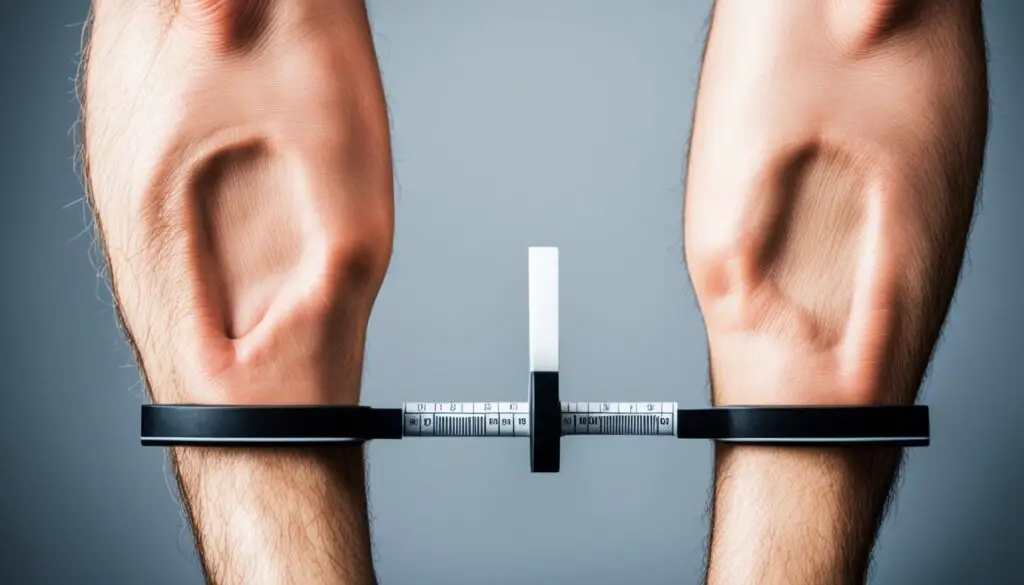
Achieving hormone balance is crucial in Testosterone Replacement Therapy (TRT) to optimize results and overall well-being. TRT involves the administration of exogenous testosterone, which can have various effects on the hormonal system.
The negative feedback mechanism in the Hypo-Pituitary Gonadal (HPG) axis plays a key role in maintaining hormone balance. This axis involves the hypothalamus, pituitary gland, and gonads (testes in males). The release of luteinizing hormone (LH) from the brain stimulates testosterone production in the testes. However, exogenous testosterone can suppress LH release, leading to a disruption in the HPG axis and potential hormonal imbalances.
Specifically, when exogenous testosterone is introduced into the body, it signals the brain to reduce the production of LH. This suppression of LH can result in decreased natural testosterone production, which can have negative consequences, including infertility.
To address this issue, Hormone Replacement Therapy (HRT) should encompass more than just testosterone replacement. It is important to consider other hormones in the system and their respective feedback mechanisms to maintain hormonal balance and support overall health.
Introducing HCG into TRT can help preserve testicular function and maintain hormonal balance.
HCG stands for Human Chorionic Gonadotropin, a hormone that mimics LH in the body. By injecting HCG alongside exogenous testosterone, the negative feedback mechanism in the HPG axis can be mitigated. HCG stimulates the Leydig cells in the testes, promoting natural testosterone production and preserving testicular function.
The use of HCG in TRT helps address the suppression of LH caused by exogenous testosterone, allowing for the maintenance of hormonal balance and the prevention of potential complications. By ensuring proper hormone balance, patients can experience the benefits of TRT while minimizing any negative effects caused by LH suppression.
The Negative Feedback Mechanism in the HPG Axis
The negative feedback mechanism in the HPG axis involves the interplay between various hormones, including testosterone, estrogen, and LH. Exogenous testosterone signals the brain to reduce LH production, leading to a decrease in natural testosterone production.
This negative feedback loop is crucial for maintaining hormonal balance. However, when LH levels are suppressed, it can result in insufficient testosterone production and potential hormonal imbalances. This can have negative effects on fertility, sexual function, well-being, and overall health.
The Role of HCG in Hormone Balance
HCG acts as an LH analogue and can help address the negative feedback mechanism in the HPG axis. By injecting HCG alongside exogenous testosterone, the Leydig cells in the testes are stimulated, allowing for natural testosterone production to be maintained.
Preserving testicular function is essential for maintaining hormonal balance and optimizing the benefits of TRT. HCG helps prevent testicular atrophy and ensures the continued production of testosterone within the testes.
Additionally, maintaining hormone balance through the inclusion of HCG in TRT can help minimize potential side effects and ensure a patient-centered approach to care.
| Benefits of Addressing Hormones in TRT |
|---|
| Preservation of testicular function |
| Maintaining hormonal balance |
| Prevention of LH suppression |
| Minimization of potential complications |
| Optimized results and overall well-being |
Preserving Testicular Size and Function with HCG
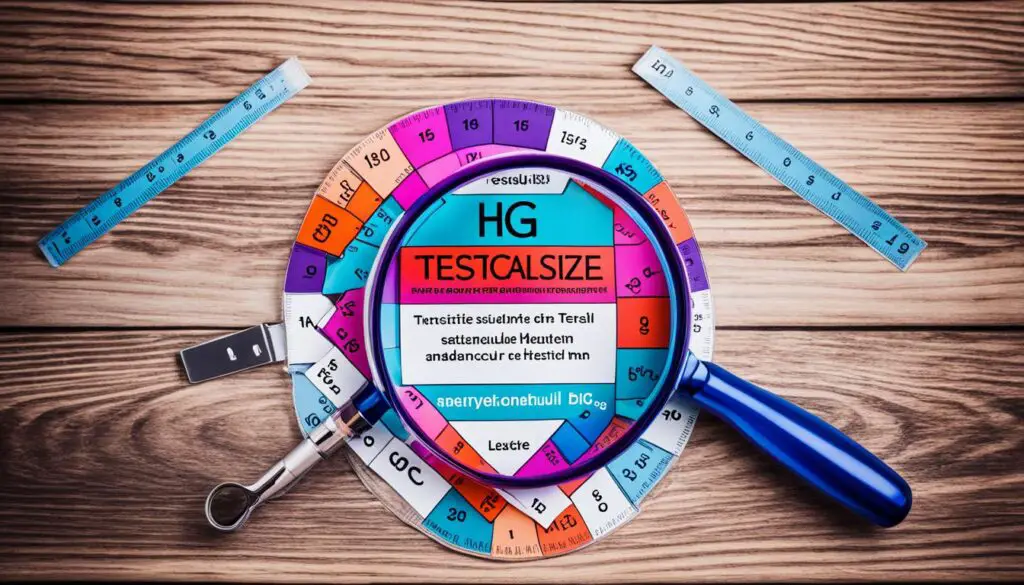
When it comes to Testosterone Replacement Therapy (TRT), maintaining testicular size and function is essential. Fortunately, HCG (Human Chorionic Gonadotropin) provides a solution that not only preserves testicular size and function but also prevents testicular atrophy and discomfort.
HCG ensures the preservation of testicular fullness, which is crucial for optimal testicular health. By mimicking the effects of luteinizing hormone (LH), HCG stimulates testosterone production in the testes, supporting testicular size and function.
Testicular atrophy, a condition characterized by a decrease in testicular size, is a common concern among men undergoing TRT. However, with the use of HCG, testicular atrophy can be minimized or even prevented. HCG helps maintain the size of the testicles, ensuring they remain healthy and functional throughout TRT.
In addition to preserving testicular size and function, HCG can also have a positive impact on penis size. As a hormone that influences various organs in the body, including the brain, HCG may contribute to enhanced brain function, cognition, and libido, which can indirectly affect penis size.
Overall, HCG plays a vital role in TRT by not only preserving testicular size and function but also preventing testicular atrophy and discomfort. With its ability to mimic LH and influence various aspects of male physiology, HCG is an essential component of hormone replacement therapy for men.
| Benefits of HCG in TRT | Risks and Side Effects |
|---|---|
|
|
Considerations and Potential Side Effects of HCG
While incorporating Human Chorionic Gonadotropin (HCG) into Testosterone Replacement Therapy (TRT) offers numerous benefits, it is important to understand the considerations and potential side effects associated with its use.
HCG Tolerance and Individual Response
Although the majority of men on HCG therapy experience positive effects, there is a small percentage who may not tolerate it well. Factors such as the testosterone to estrogen ratio and individual response can influence how well a person tolerates HCG treatment.
The Testosterone to Estrogen Ratio
The balance between testosterone and estrogen is crucial for optimal health and well-being in men. HCG therapy can influence this balance, and healthcare providers may monitor hormone levels to ensure the ratio remains within a healthy range.
HCG and Anxiety
Some men may experience increased anxiety while on HCG therapy. It is important to communicate any changes in mood or mental health to your healthcare provider to evaluate the potential impact of HCG on anxiety levels.
Positive Effects of HCG
Despite the considerations, the positive effects of HCG in TRT are widely acknowledged. Many patients report improved well-being, increased energy levels, enhanced libido, and a greater sense of satisfaction with their overall TRT experience when incorporating HCG.
Patient-Centered Care in TRT
Providing patient-centered care is essential in TRT to ensure individualized treatment plans and address any concerns or side effects that may arise. Regular communication with healthcare providers can help optimize the benefits of TRT while managing any potential side effects associated with HCG therapy.
By considering these factors and maintaining open lines of communication with healthcare providers, patients can receive the most appropriate and effective TRT experience with HCG as part of their treatment regimen.
Availability and Safety of HCG
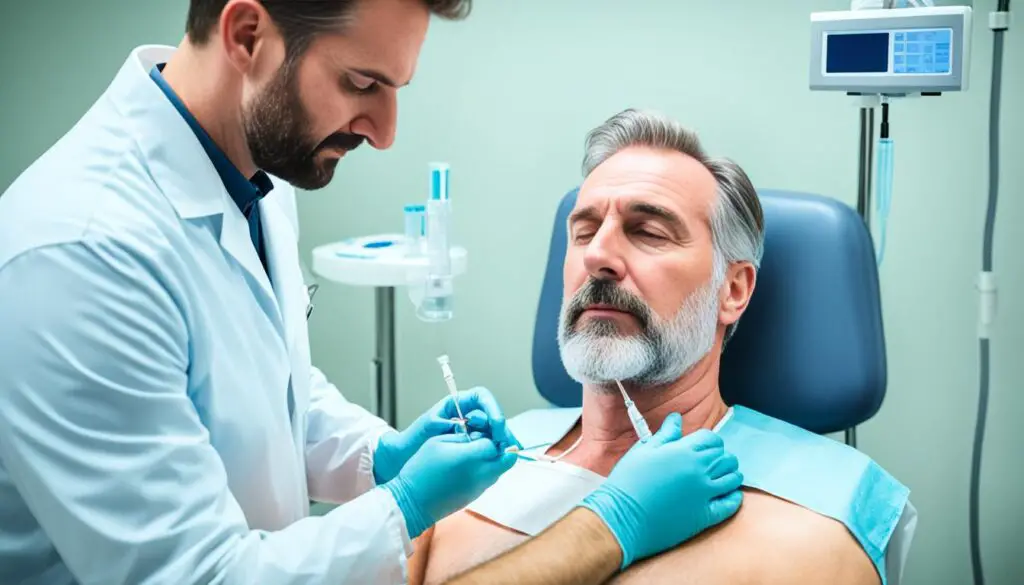
HCG, or human chorionic gonadotropin, is an FDA-approved hormone that serves various purposes in medical treatment. It is commonly used for the treatment of infertility in women and the management of hypogonadism symptoms in men. When administered under the supervision of a qualified healthcare provider, HCG has been deemed safe and effective in addressing hormonal imbalances and improving fertility and sexual function.
Obtaining HCG from a reliable source is crucial to ensure its quality and effectiveness. It is essential to adhere to the prescribed dosage and administration guidelines to maximize the benefits and minimize the risk of side effects. Patients should consult with their healthcare provider and follow their recommendations for the safe and appropriate use of HCG.
By incorporating HCG injections into treatment plans, healthcare professionals can help individuals improve their fertility, enhance sexual function, and address other hormonal imbalances. The availability of FDA-approved HCG provides reassurance regarding its safety and effectiveness in medical applications.
| Aspect | Safety Considerations |
|---|---|
| Administration | Supervision and adherence to prescribed dosage and administration guidelines are crucial to ensure safe and effective use. |
| Side Effects | Common side effects may include an increase in breast size, acne, redness at the injection site, headaches, and gastrointestinal discomfort. Serious side effects are rare but should be reported to a healthcare provider immediately. |
| Reliability | Obtaining HCG from a reliable source is important to ensure its quality and effectiveness. |
| Supervision | Using HCG under the supervision of a qualified healthcare provider helps ensure safe and appropriate treatment. |
HCG injections have shown positive outcomes in terms of fertility improvement and addressing sexual function issues. However, it is crucial to emphasize that the use of HCG should be in accordance with medical advice, as individual responses and specific medical conditions may influence its efficacy and safety.
Administration and Potential Side Effects of HCG
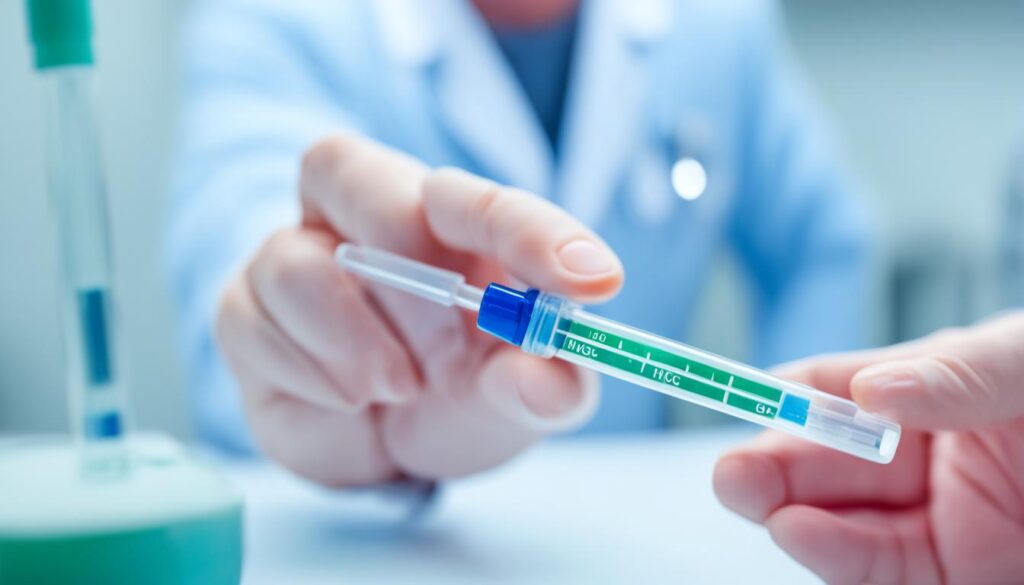
When it comes to HCG, proper administration and understanding of potential side effects are essential. HCG is typically administered through injections into the lower abdomen, providing a convenient and effective route of delivery.
To maintain the desired effect, the recommended dosage ranges from 350 to 500 IU, two to three times a week. This dosage regimen ensures a consistent level of HCG in the body, optimizing its function in conjunction with testosterone replacement therapy.
While HCG offers numerous benefits, it’s important to be aware of potential side effects. Some common side effects may include an increase in breast size and acne. These effects are temporary and typically subside with continued use. Additionally, redness at the injection site, headaches, and gastrointestinal discomfort may occur but are generally mild and transient.
Serious side effects are rare; however, it’s crucial to report any unusual or concerning symptoms to a healthcare provider immediately. They can assess the situation and provide appropriate guidance to ensure your well-being and safety.
In conclusion, while HCG is a valuable component of testosterone replacement therapy, its proper administration and potential side effects should be carefully considered. By following the recommended dosage and promptly addressing any concerns with a healthcare provider, you can optimize the benefits of HCG while minimizing any potential risks.
Conclusion
In conclusion, HCG plays a crucial role in Testosterone Replacement Therapy (TRT) for men by maintaining fertility, testicular function, and overall well-being. By including HCG as part of a comprehensive hormone balance approach, men can experience various benefits such as the preservation of testicular size, enhanced libido and cognition, and potential up-regulation of steroid hormones.
One of the key advantages of HCG in TRT is its ability to stimulate testosterone production in the Leydig cells of the testes, addressing the issue of suppressed LH levels commonly encountered in traditional TRT. By mimicking LH, HCG supports the natural intra-testicular production of testosterone, ensuring optimal hormone levels and fertility preservation.
Men undergoing TRT should consider the importance of hormone balance, as exogenous testosterone can disrupt the negative feedback mechanism in the Hypo-Pituitary Gonadal (HPG) axis. Including HCG alongside testosterone therapy helps preserve testicular function and maintains hormonal balance in the body, leading to improved well-being and overall satisfaction.
Overall, HCG is an essential component of Testosterone Replacement Therapy for men. Its role in maintaining fertility, testicular function, and overall hormone balance cannot be understated. By incorporating HCG into TRT, men can achieve optimal results and experience the full benefits of hormone replacement therapy.
FAQ
What is HCG Hormone Balance for Men’s Health?
HCG Hormone Balance for Men’s Health refers to the use of HCG (human chorionic gonadotropin) therapy in men to maintain fertility, testicular and penis size, cognitive function, and libido. It is an important aspect of hormone replacement therapy for men.
What role does HCG play in Testosterone Replacement Therapy?
HCG is used alongside Testosterone Replacement Therapy (TRT) to preserve testicular function and maintain testosterone production. It helps to maintain fertility and other hormonal balance in the body.
How does HCG work in the body?
HCG mimics luteinizing hormone (LH) and stimulates testosterone production in the testes. It works by stimulating gene expression and downstream steroid synthesis, providing a more constant stimulation compared to LH.
Why is HCG important in Hormone Replacement Therapy?
HCG is important in Hormone Replacement Therapy (HRT) as it helps preserve testicular function and maintain hormonal balance in the body. It is necessary to consider hormones beyond testosterone for optimal hormone replacement therapy.
What are the benefits of HCG in Testosterone Replacement Therapy?
HCG offers benefits such as improved fertility, preservation of testicular and penis size, enhanced libido and sensitivity, and potential up-regulation of steroid hormones in Testosterone Replacement Therapy.
How does HCG affect testicular function?
HCG plays a crucial role in maintaining testicular function and spermatogenesis. It stimulates intra-testicular testosterone production, contributes to the maturation of sperm, and helps maintain the blood-testis barrier.
Why is hormone balance important in Testosterone Replacement Therapy?
Hormone balance is important in Testosterone Replacement Therapy to ensure optimal results. Exogenous testosterone suppresses LH release, which can lead to infertility. HCG helps to preserve testicular function and maintain hormonal balance in the body.
How does HCG help preserve testicular size and function?
HCG not only helps maintain testicular size and function but also prevents testicular atrophy and discomfort. It ensures the preservation of testicular fullness and can have a positive impact on penis size.
Are there any considerations or potential side effects of HCG?
While most patients experience the benefits of HCG alongside testosterone therapy, there may be a small percentage of men who do not tolerate it well. Factors such as testosterone to estrogen ratio and individual response may influence tolerance. Patient-centered care is crucial in Testosterone Replacement Therapy.
Is HCG safe and readily available?
HCG is an FDA-approved hormone used for the treatment of infertility in women and hypogonadism symptoms in men. It is safe when used under the supervision of a healthcare provider. HCG injections are available and can help address fertility, sexual function, and other hormonal imbalances.
How is HCG administered and what are the potential side effects?
HCG is typically administered through injections into the lower abdomen. The recommended dosage is 350 to 500 IU two to three times a week. Common side effects may include an increase in breast size, acne, redness at the injection site, headaches, and gastrointestinal discomfort.
What is the summary of HCG in Testosterone Replacement Therapy?
HCG plays a crucial role in maintaining fertility, testicular function, and overall well-being in men on Testosterone Replacement Therapy (TRT). It helps preserve testicular size, enhances libido and cognition, and has potential benefits for steroid hormone up-regulation. HCG should be considered as part of a comprehensive hormone balance approach in TRT for optimal results.

